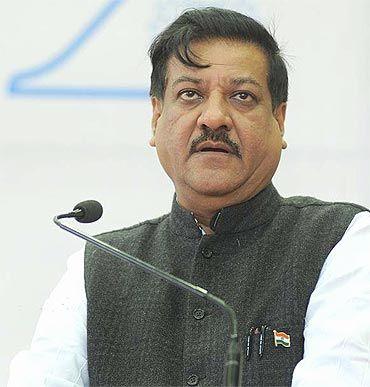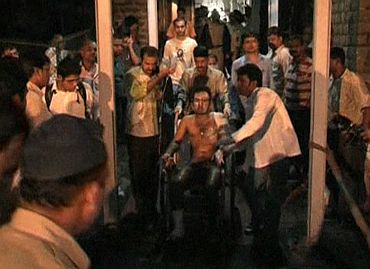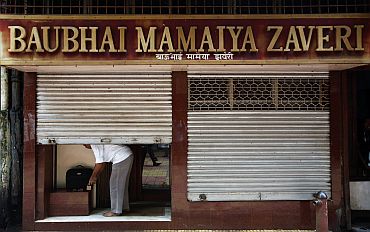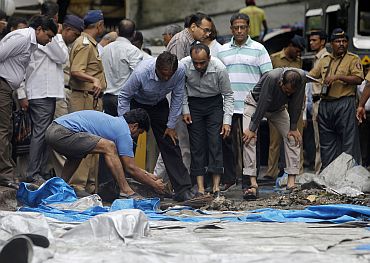Maharashtra Chief Minister Prithviraj Chavan speaks to CNN-IBN on Wednesday's triple blasts in Mumbai and how secure is the megapolis from terror. Edited excerpts:
In the last two days since the blasts there has been anger on the streets of Mumbai and against your government. Do you accept that the anger is legitimate?
It is legitimate. Mumbai has been attacked on a number of occasions. People are angry why we could not prevent it and I appreciate the feelings, outpourings of anger, we all are also angry.
But the point is the government will have to carry on with its task, we have to learn our lessons. I can assure you that after 26/11 attacks whatever systems that have been put in place both by central government and our government in Mumbai following the recommendations of the Ram Pradhan committee, things are much better.
You say things are better, but there is cynicism that little really has changed. R R Patil, your home minister, was home minister during 26/11. Vilasrao Deshmukh, who was then CM, is now a Cabinet minister. As such, no one has been held accountable. The political system doesn't hold anyone accountable. Has that changed? Will someone be held accountable this time?
I think what we need to do is no matter whoever is in seat, somebody will have to be in seat of power, and somebody will have to govern. What we need to do is that we have to be better prepared to prevent any future recurrence, that the intelligence apparatus is in a much better shape, that whatever modernisation plans we have put in place are completed in time. That we get the best equipment, training and facilities for our police and intelligence force.
I think many of the things I have said have been put in place. Maharashtra has now the Maha Intelligence academy, the first state to have such thing. We have specialised training from foreign experts.
...
'We are not ruling out any possibility'
Image: A plain-clothed policeman surveys the aftermath at the site of an explosion near the Opera House in Mumbai on WednesdayPhotographs: Vivek Prakash/Reuters
Would you accept there was an intelligence faliure?
No, Union Home Minister P Chidambaram has clearly distinguished between a failure and not having leads.
Intelligence failure could be defined when there was something which was obvious and people failed to look at it or analyse it. In this case there was a fairly low-level operation with easily available raw material; a very small group -- not even a module -- could have put these devices together.
There is CCTV footage that we'll try to analyse and find out whether it was a coordinated attack or not. We routinely monitor electronic equipment, nothing came up, and there was no lead from New Delhi. So I think it is difficult to define this as an intelligence failure. Yes, we need to increase our intelligence capabilities that if there was any item on the net or anywhere else, it should have been picked up and analysed correctly.
Do you think the Indian Mujahideen remains the prime suspect? Some are even suggesting that Mumbai underworld could have tied up with some of these terror groups.
I will not speculate on who did it, this is for the investigating team to do. We have put in place a team under the leadership of Rakesh Maria, who is the chief of the Anti Terrorism Squad, and Joint Commissioner of Police (Crime) Himanshu Roy. They are also being aided by the National Investigating Agency, the National Security Guards from Delhi. All have been put together. We have created many task forces and every little angle is being probed. We are not ruling out any possibility. I will not jump to conclusions at this stage.
But Mumbai is repeatedly targeted. Why is Mumbai so vulnerable?
If you put yourself in the shoes of the terrorist he would cause damage where it hurts the most. Mumbai is a crowded city, the locations chosen for the Wednesday attack were very crowded.
Attacking a place like Zaveri Bazaar will hurt the psyche of the city and the country, so the attackers chose their targets to cause maximum damage and that is why it is not because of lack of security in Mumbai, but because it was is an attractive target.
Gujarat, Delhi, Varanasi have all been attacked. People choose targets for different reasons. To draw a conclusion that Mumbai is being attacked because it is an easy target, that there are lacked system, is not acceptable.
'Procurement of equipment is a problem'
Image: A victim being rushed to hospitalPhotographs: Reuters
Do you concede that the informal network of mohalla committees, the citizen-police relationship, is breaking down in Mumbai somewhere?
To say that informal network has broken down is not correct. The murder of journalist J Dey was cracked only because of the informal network. Maybe we need to strengthen the informal network in the areas where terrorist activities happen, but still the intelligence gathering agencies are very active.
After 26/11, a better intelligence sharing system has been put in place. After 26/11, many things worked, some did not, we are trying to find out why some things did not work and whatever worked we are trying to improve further.
The coastal security is still vulnerable. Would you concede that many of the recommendations of the Ram Pradhan committee and all that was discussed after 26/11 have still not been implemented on ground?
Everything that has been recommended has not been done, like purchase of close circuit cameras have not been completed, as procurement is a problem. Our coastal security system has been put in place, however it is not up to the mark yet, but we have started putting the coastal security situation in place.
New boats have come, and we have set up a marine police station, there are things happening. At the same time, the police organisation programme has not moved as rapidly as we would have liked to. I am looking into why it is difficult to procure equipment.
You are saying it is becoming difficult to procure equipment -- so you are accepting modernisation, CCTV cameras are a problem...these are genuine problems you are faced with?
Yes, purchase of security equipment, whether it is at the level of ministry of defence or home ministry or various state police organisations, is difficult. People are put in administrative duties for a shot time of 2-3 years. Nobody wants to take the risk of selecting low standard equipment.
Technologies move very fast, our procurement period takes years to complete, and if you get equipment immediately you will be accused of buying obsolete equipment and therefore people are afraid to take decisions. I brought this up to Prime Minister Manmohan Singh and Union home minister and we are all facing the problem at respective levels.
'We want the businessmen in Zaveri Bazaar to shift immediately'
Image: A businessman locks his shop at Zaveri Bazaar after the blastsPhotographs: Danish Siddique/Reuters
The diamond bourses are talking of moving out to the suburbs of Mumbai. They are frightened to live in these congested areas. What would you tell them today? Should they move out and decongest that part of central and south Mumbai?
Yes they must, there is a brand new diamond bourse that is being created at the Bandra Kurla Complex, which I think is perhaps the best in the world. I don't understand why people have not moved to the new bourse. Maybe the costs are slightly higher but there are very good facilities there. If there are any concerns about security we will address them.
I will interact with them soon and find out why they have not moved. We want them to shift immediately.
Only 30,000 policemen in a city of 2.5 crore people. Citizens argue a majority of that is used for VIP security. What are you going to do to bolster active policing instead of passive policing for VIP security? What would you say to the angry Mumbaikars who say it's time to change policing?
This is over exaggerated. You should not flaunt it but those who have to be protected should be protected only based on threat perception. The policemen engaged in policing are far larger than those engaged in VIP security.
One fear is that rain will wash away the evidence. How real is that threat as you piece together the investigation?
I was informed by the Union home minister that the teams which came from Delhi -- like the NIA, Central Forensic Laboratory team, clubbed with our own team -- have collected forensic samples that they need You need blood samples, fragments of explosives, etc. And they have collected that. The rain might have washed away little evidence, but they have collected enough evidence.
'Let's not speculate'
Image: A man moves debris during a clean-up operation near Opera HousePhotographs: Vivek Prakash/Reuters
Is the theory of 'suicide bomber' being explored?
What was given by the MHA to media on Thursday was that it was a bomb made out of ammonium nitrate and fuel oil and a triggering device.
Perhaps they are fragments of that triggering device what people talk about as a circuit. But for lay persons like me, if it was a remotely triggered device, it need not be carried personally.
Had it been carried by a suicide bomber there would have been a switch attached to the body and there was no need of a remote control. Let's not speculate.
We need to find the answers and the guilty. But let the experts and investigators do their job and let's not insist on a running commentary on what happened in the morning and in the afternoon.
The Opposition alleges that your government is soft on terror and they also dig on (Congress general secretary) Rahul Gandhi's statement that 'We can avoid terror attack in 99 per cent of cases but one percent can't be avoided.' This is seen as an insensitive statement and rather suggests that cities like Mumbai will face a terror strike every now and then.
I won't comment on it. Enough have been commented on this. I think we are placed in a situation based on the geographic location and the historic problems we had faced with, we have to do our best to prevent the attacks.
I think attacks can be prevented with good intelligence network and technical support. The examples of Western countries are before us and now we can afford to spend money on our security. We have to protect the city, which creates so much wealth, generates so many jobs and helps to establish India as a brand. I think it is within the capability of the Indian State to do that.
'For first 15 minutes, there was complete breakdown in communication networks'
Image: Policemen surround a vehicle which was damaged at the site of an explosion in the DadarPhotographs: Reuters
Would you assure the Mumbaikars that there would never be another attack or would you say that we are living in dangerous times and we would be doing our best to ensure security?
For anybody to promise 100 per cent result on security will be very ambitious. It will be our endeavour to ensure that no terror attack happens in Maharashtra. No attack happens in Mumbai and attackers are caught and punished.
We have to ensure that our intelligence and security capabilities are the best in the world. We should spend enough money to achieve that capability. I will not enter into percentages.
Let us do our best, we live in difficult neighbourhood and difficult times. As we are a growing country, we are target of jealous neighbours. Once the investigations are complete, we will be able to know whether there was any external support in this attack or whether it was a state-level or national-level operation. We value and analyse every single suggestion received from media and experts. I will meet Opposition shortly on this issue.
Do you think the series of attacks have divided the city? The cosmopolitanism of city is just a bogus talk and people are tired of it. Do you fear that it is a scarred and divided city today?
I won't share that view that Mumbai's cosmopolitanism is bogus. It's a fact that Mumbai is a cosmopolitan city. It's evident that the terror strikes are targeted to create a communal divide. But inspite of that Mumbai has not erupted into violence and the credit goes to the people of Mumbai. It's unfair to say people don't have a choice.
Irrespective of the attacks people will have to carry on with their lives. I appreciate the point that people are not happy about the talk of 'resilience of Mumbai.' I accept that sense of shame and anger. But calling it a divided city is not a fair comment at all.
What is the biggest learning for you as the chief minister in last 48 hours?
It's important to exude confidence in our police force. It's important to work together at a political level. We have to appreciate the changes since 26/11 and we have to learn from the things that went wrong.
I was in Mantralaya while I got the message that there was a blast. I immediately wrapped up my interactions and rushed to the control room and remained there till 3 am. It was very easy for me to monitor everything from there. For the first 15 minutes there was complete breakdown of the communication systems. We depended on our mobile phones and radio wireless communication devices.
Our statewide VHF network is not in use now and we are trying to revive that as a backup. I've talked to the national security people to develop a secure network that the situation of the first 15 minutes of network jam should not happen.







article